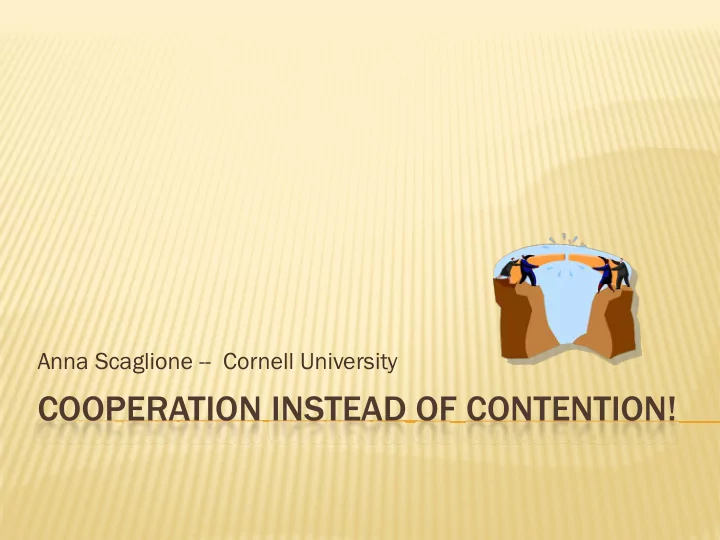

Anna Scaglione -- Cornell University COOPERATION INSTEAD OF CONTENTION!
THE NEBULOUS CONCEPT OF WIRELESS LINK…. � Network architecture & process of abstraction go hand in hand � Wired nets � “link” is a useful abstraction directly tied to the physical medium � Wireless nets � the “link” notion is nebulous � Assumptions in current multi-hop networks � (Constraint I) (Constraint I) A functional physical layer communication link can originate from only one transmitter; � (Constraint II) (Constraint II) Concurrent transmissions of multiple transmitters result in interference that, if not sufficiently attenuated by spatial or channel multiplexing, produces a collision � distortion irreversible at the ultimate receiver
(INCONVENIENT?) TRUTHS AND COMMON MISCOCEPTIONS Tr Truths � There are always unintended recipients � Signals do not collide, they add up Misconcep Misconceptions ions (A) Cooperation is practically more complex than the (A) � collision model (B) (B) Because the information theoretic capacity of � networks is unknown, the physical layer is going to get us into truly messy models that will not scale and will be not lead to a decentralized protocol
FOUNDATIONS OF MISCONCEPTION (A) � You have to select one cooperative node at a time or you need to use space-time coding which is more complicated than doing multiple access Distributed Space Time coding: [Laneman’03]
RANDOMIZED COOPERATION SHOWS THAT (A) IS A MISCOCEPTION � You can cooperate without having any idea of who else is doing it � The receiver does not need to know how many nodes actually cooperate In case y In case you care: u care: L=code diversity N=number of nodes You get full diversity if L=N-1 = % x G s r ( ) The loss in BER is very modest 1 1 = compared to a centralized % s x G s r ( ) y 2 2 ⊕ assignment = % x G s r ( ) 3 3 = % x G s r ( ) 4 4 4 ∑ % = + = + = + % y x w G s r r r r h w ( )( , , , ) G s h w ( ) H 1 4 2 4 3 i i 1 2 3 4 = i 1 1 4 4 2 44 3 R % h
THIS ALLOWS TO ESTABLISH MISCONCEPTION (B) Traditional network Cooperative flooding broadcast Source Source CONTENTION � COOPERATION � � Flooding is the perfect example where the collision model is an oxymoron � Cooperation alleviates the collision resolution problem and routing problems � The analysis is not only possible, it is fascinating….
DENSE COOPERATIVE NETWORKS � Model � very dense cooperative networks, the source is in the middle and there is a continuum of nodes each relaying with infinitesimal power � Each node only cooperates once and does so if its received SNR is above a certain threshold (cooperation in successive levels/groups) Signal received: Random signal to noise ratio Random locations of nodes in level k
A COUNTERINTUITIVE TRUTH: DUMB CODING WORKS BEST! � Probability of receiving at the K-th level A fraction of node experiences excellent fades (opportunistic beam-forming) You cannot get that if you do not add on the channel Finite network simulation
CONCLUSIONS � What is the cost/overhead of cooperation?? *Vir Virtually none* ually none* � Multicast case � just shut the MAC down and let them transmit � Using RTS-CTS you can apply this also to unicast… � Message for the “systems” group: � We can (and I my view should) consider a broader concept of link even if we do not know the information theoretic capacity of a network � Lesson I learned: � Even when looking at PHY, do not expect always to read what to do from setting up an optimization problem
APOLOGIES AND ACKNOWLEDGMENTS � I apologize for discussing my group’s work � let me acknowledge the thesis work Birsen Sirkeci Mergen (faculty at San Jose’ State since 2006)
Recommend
More recommend